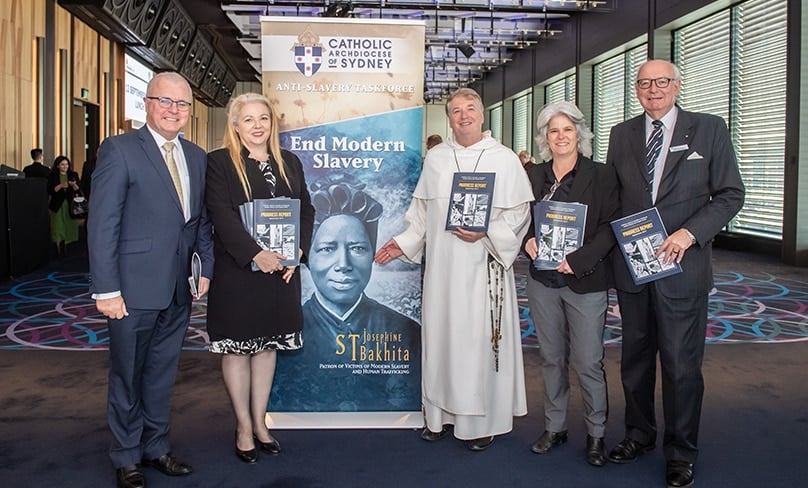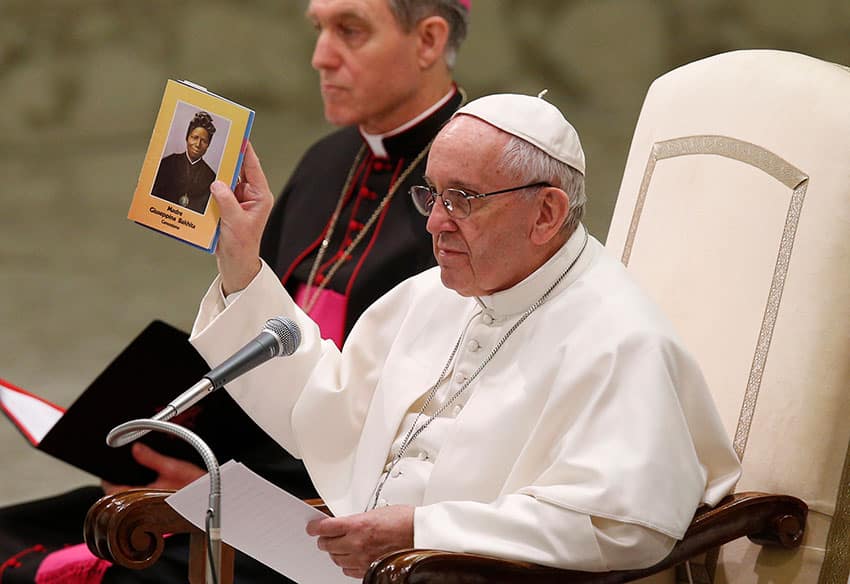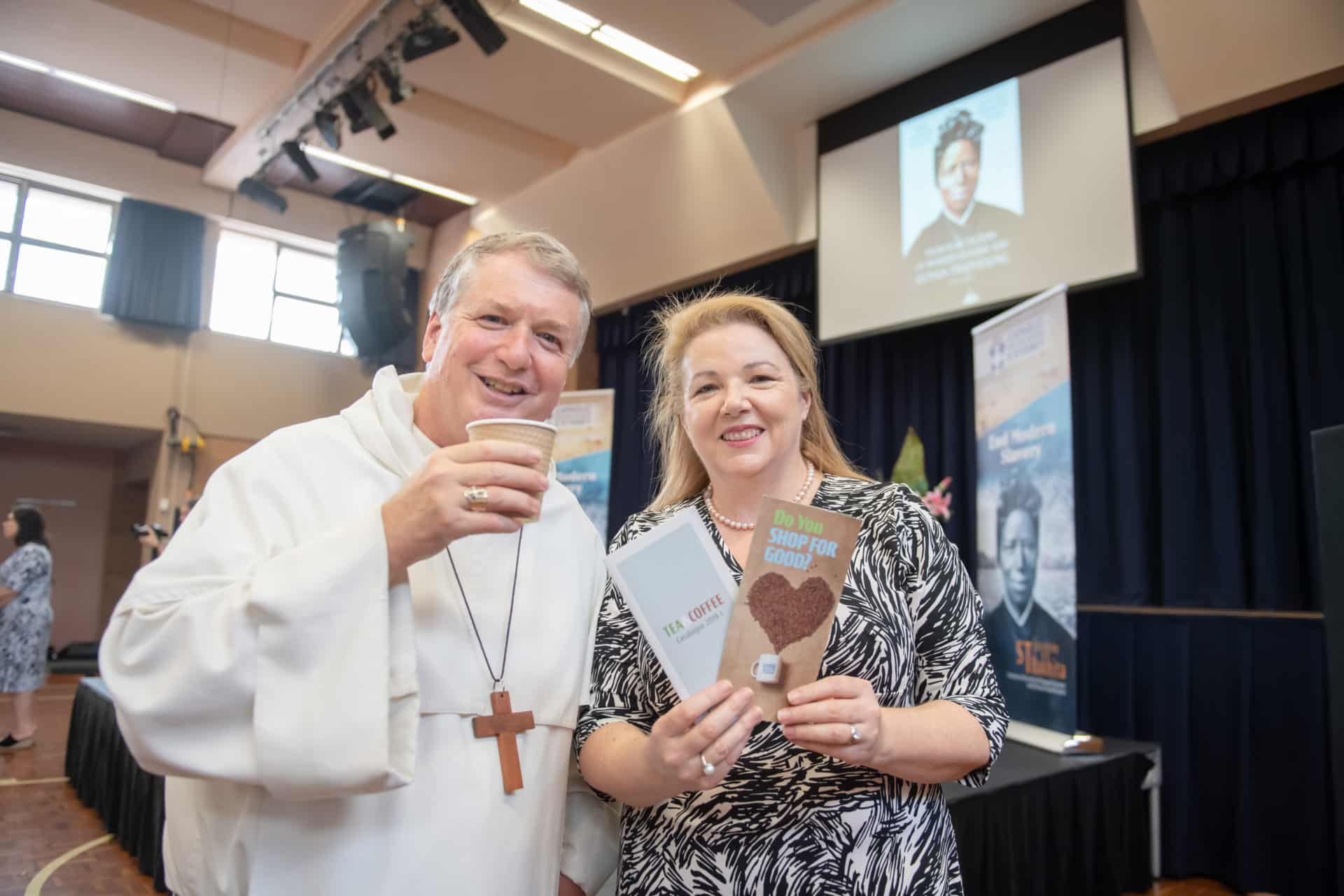
In just four years, Sydney’s Anti-Slavery Taskforce has made giant progress.
When then- Auxiliary Bishop Anthony Fisher OP concluded the celebration of Mass on a sunny Sunday morning in the picturesque harbour-side parish of Watsons Bay in mid 2007, he had a pivotal conversation with a young South American woman which was to sow the seeds for a project which has now turned international attention to the Archdiocese of Sydney.
The woman had been lured to Australia by a local family to work as a nanny, under the false impression that she would be making a whole new life for herself in Sydney.
“Instead, her passport was taken away from her by her employers, she was not allowed any recreational activity outside the house and she was not paid any pocket money or wages”, now Archbishop Fisher shared at a parliamentary committee hearing a decade later into human trafficking in NSW.
“The whole experience left the future Archbishop with a strong call to action as he came to appreciate the pivotal role the Catholic Church could play in supporting the victims of modern slavery …”
“Her employer finally allowed her to go to church because she was a religious woman and that gave her a chance to come and speak with me. She said she had tried at one stage to escape to a neighbour. She told the neighbour what was happening to her and the neighbour had effectively man-handled her back to the house of her employers as if she was an escapee from prison or old-style slavery”.
“That experience brought home to me that this is very real, it’s here in our own city and I did my best to intervene at that time and I got her out of that situation, with help from the police and from Catholic Care, our social welfare agency of the Church”.
The whole experience left the future Archbishop with a strong call to action as he came to appreciate the pivotal role the Catholic Church could play in supporting the victims of modern slavery and helping to eradicate a practice which was profoundly against Catholic social teaching.
Only a matter of months after that parliamentary committee appearance, Archbishop Fisher established an Anti-Slavery Taskforce in the Archdiocese of Sydney, chaired by Australia’s former Ambassador to the Vatican, Mr John McCarthy QC.
The new taskforce had a strong mandate to put Catholic social teaching into practice, committing itself to a number of key initiatives, including slavery proofing all procurement by the Archdiocese of Sydney and its agencies and to investigating the provision of needs-based services for survivors of modern slavery in Australia.
From its outset, the taskforce has also been firmly focused on influencing key stakeholders across the Catholic Church, helping to raise awareness and in turn purchasing decisions on the part of parishioners, schools, healthcare operators and dioceses across the country.
Now, less than four years after it was established, the Anti-Slavery Taskforce of the Archdiocese of Sydney has attracted global praise for its work and has been credited with having set an international benchmark for Catholic and other organisations to follow in this important field.
“One of the stand-out achievements of the Taskforce has been the way it has helped establish a new national anti-slavery body, the Australian Catholic Anti-Slavery Network …”
The Chancellor of the Pontifical Academy of Sciences and the Pontifical Academy of Social Sciences, Argentine-born Cardinal Marcelo Sanchez Sorondo has gone as far as describing the Archdiocese of Sydney’s Anti-Slavery Taskforce as a model for the Catholic Church to follow on addressing modern slavery through better management of procurement and supply chains.
One of the stand-out achievements of the Taskforce has been the way it has helped establish a new national anti-slavery body, the Australian Catholic Anti-Slavery Network (ACAN), bringing together over 40 Catholic entities including dioceses, health, education and welfare bodies, accounting for total annual revenue of $22.3 billion and $6.38 billion in annual procurement.
ACAN has allowed the Catholic sector, the second largest employer in the country after governments, to pool their resources and expertise together in their efforts to ensure supply chains and procurement processes are slavery-free.

The formation of ACAN has helped Catholic organisations meet their obligations under the federal Modern Slavery Act. Under this legislation, entities with consolidated annual revenue of more than $100 million must provide an annual Modern Slavery Statement on what risks of modern slavery have been identified, the steps they are taking to ensure their supply chains are slavery-free and how effective those measures are.
The consolidation of Catholic resources in the anti-slavery fight has also led to the establishment of the confidential support service for the victims of modern slavery, Domus 8.7.
The service, which will be fully operational by the end of 2021, will help connect modern slavery victims in a confidential way with services such as interpreters, healthcare services, financial advisors and welfare support.
Taskforce Chairman John McCarthy, Executive Officer Alison Rahill and Executive Manager Jenny Stanger have been invited to address numerous international conferences on these initiatives, including for the Santa Marta group, an alliance of international police chiefs and bishops from around the world, endorsed by Pope Francis, working together to eradicate human trafficking and modern slavery.
“We are having a lot of success in raising greater awareness on this at a global level and we will be presenting our recently compiled compendium of Modern Slavery statements … to the Holy Father himself over coming months.”
“What’s truly unique about our approach and which the corporate sector is keen on learning from us, is the formation of a national network dedicated to addressing this issue. What is particularly encouraging has been the growing numbers of Catholic organisations wishing to join the network which I expect will be over 50 by this time next year”, Mr McCarthy explains.
“We are having a lot of success in raising greater awareness on this at a global level and we will be presenting our recently compiled compendium of Modern Slavery statements from ACAN members to the Vatican Dicasteries and to the Holy Father himself over coming months”. Mr McCarthy said many Australians would be alarmed to learn how significant a problem modern slavery and human trafficking is in the country.
The United Nations estimates there are approximately 15,000 victims in Australia. More than 40 million people are estimated to live in modern slavery around the world, with children thought to make up around a quarter of victims.

Mr McCarthy emphasises that consumer engagement is equally if not more critical in the fight to eradicate modern slavery.
As part of its efforts in this area, the Anti-Slavery Taskforce has established Shop for Good, an information resource to help consumers make ethical purchasing decisions around common goods including tea and coffee, chocolate, clothing and sporting goods.
The Anti-Slavery Taskforce has plans to grow this into a national movement and alongside this work, it has also been engaging with universities to offer internships to law students to help them appreciate the extent of modern slavery in Australia and develop skills in critiquing Modern Slavery statements, prepared to help organisations meet their legislative obligations.
Over 45 students from the Australian Catholic University and Macquarie University have undertaken these internships as part of the research component of their undergraduate studies.
“I’ve seen first-hand the impact exploitative supply chains can have including in China and India where I’ve seen child slaves and horrendous working conditions in factories.”
As part of these projects, they prepare detailed reports, examining how Australian companies and not-for-profit organisations are addressing modern slavery risks in their operations and supply chains.
Last summer, a number of fourth and fifth year law students from the ACU Thomas More Law School Pro Bono Program spent more than 500 hours examining 188 Modern Slavery Statements published on the Commonwealth Modern Slavery Register, under the guidance of the Anti-Slavery Taskforce.
A member of the team who worked with the students was Carsten Primdal, a business manager who has provided strategic advice on supply chain management to leading companies in Australia and overseas for nearly a decade.
The Anti-Slavery Taskforce appointed Mr Primdal as its Remediation and Business Engagement Advisor last year and his global expertise has been invaluable.

“I’ve seen first-hand the impact exploitative supply chains can have including in China and India where I’ve seen child slaves and horrendous working conditions in factories”, he said.
“I was attracted to working with the Anti-Slavery Taskforce because what they’re doing is quite unparalleled anywhere else in the world, in terms of the scope of the organisations involved on a national level that are leading a real cultural shift towards ethical supply chain management”.
A graduate of the Copenhagen Business School, Mr Primdal said he is not surprised by the global interest in the innovative projects being led by the Taskforce.
“I’ve seen business groups in Europe take 20 years to achieve the progress in this area which the Taskforce has achieved in less than five years,” he said.
“I was attracted to working with the Anti-Slavery Taskforce because what they’re doing is quite unparalleled anywhere else in the world.”
ACU law student, Sarah Curran has undertaken two internships with the Anti-Slavery Taskforce, in which she has examined and reported on Modern Slavery statements across transport and logistics, agriculture and fisheries.
“It has really opened my eyes to the extent of the problem in Australia, especially in the agriculture sector where many short-term visa holders are at particular risk of exploitation.
After I graduate , I would definitely like to work in a more community-oriented area of the legal profession focused on helping the disadvantaged and this program has definitely shifted my career hopes in a far more community-driven direction”, she said.
Related Articles:
